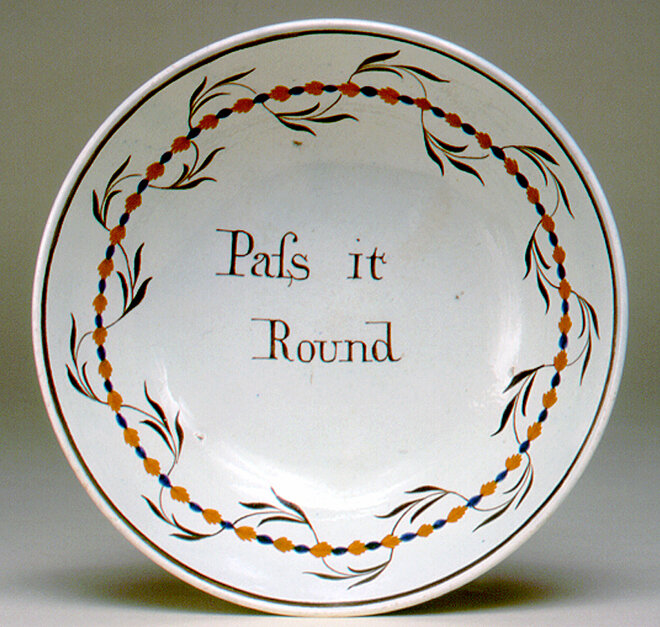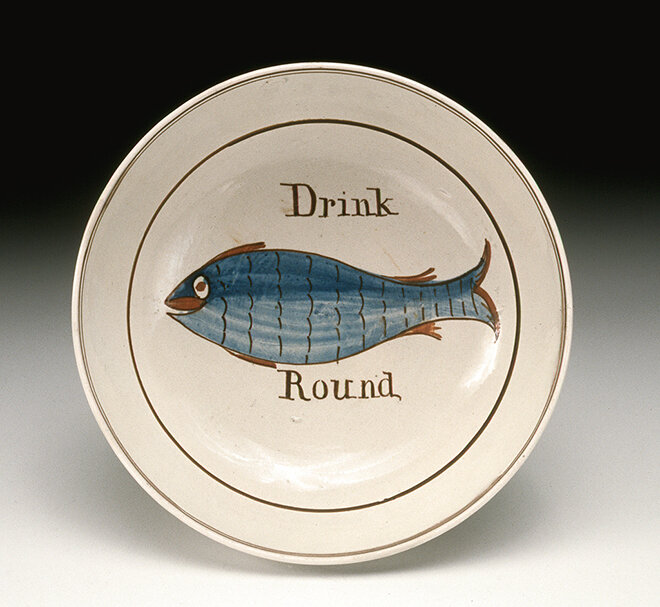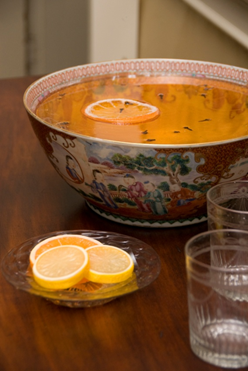Welcome to our December Maker Mondays blog. We hope you are healthy, in good “spirits,” and enjoying this holiday season: as unusual as it is. One of the many ways of celebrating holidays is with special food and drink. In this installment of Maker Mondays we want to treat you to some recipes for holiday drinks that were popular in early New England. Special drinks call for special ways of serving them. Punch was one such drink, and was often served from specifically designed punch bowls. There are many beautiful examples of punch bowls in Historic Deerfield’s collection. Here are two we hope you will enjoy!

Pass it Round Punch Bowl, Pearlware, 1785-1795
HD 2000.35
The first we want to show you is this ceramic bowl inscribed with the words “Pass it Round” in the center well of the bowl. The inscription is significant because it defines how punch was often consumed. Punch could be ladled into glasses or could be drunk directly from the bowl. As shocking as this seems today, it was a custom to pass the bowl around the table with the expectation that each guest would take a drink and “pass it round” to the next guest. As the bowl was emptied, mottos or rhymes inscribed in the well often prompted revelers to toast their companions and to continue drinking. The “Pass it Round” toast is part of this tradition. Some verses include: “Drink about/ See it out / Come be quicker/ Fill more liquor.”

Fish Punch Bowl, Pearlware, ca. 1780
HD 1998.6.2
The second bowl we admired for its beauty and sense of humor. Labeled in the collection as the “Fish Punch Bowl,” it is another example of English pearlware. In the well of the bowl is a blue and orange fish surrounded by the words: “Drink” and “Round”. The fish motif, popular on English punch bowls, was recognized as a visual pun, indicating to drinkers that the bowl must be kept full of liquid so the fish could continue to swim!
To tempt you further we want to show you how beautiful the punch looks as it is displayed in a punch bowl in Historic Deerfield’s Stebbins House. In the dining room a table is set with an elegant arrangement of early nineteenth-century desserts. Close at hand is a card table graced with a full punch bowl, cloves, and a slice of lemon floating in the golden punch. Although the dessert and punch displays in the Stebbins House dining room are comprised of faux food created especially for the room, they are realistic enough to make your mouth water.

Five ingredients are traditional in punch: spirits (usually rum or brandy), citrus (lime and lemons), spices, sugar, and water. Interestingly, the word “punch” is ancient and comes from the Hindi word panch which means “five,” standing for the five ingredients. From its origin in India, the recipe for punch was carried via trade routes to the Caribbean and later to the Colonies.
Now that we have captured your interest, we thought you might like to read some traditional recipes for punch, followed by contemporary recipes. The first recipe for British Punch comes from Louise Conway Belden’s The Festive Tradition: Table Decoration and Desserts in America, 1650-1900 (New York, 1983).
British Punch – Historic Recipe
“Rub 1/2 lb. sugar lumps on the rind of 4 lemons and 1 orange to extract the oil. Place lumps in a 2 gallon bowl. Pare thin and add the pared skin of 2 lemons and an orange. Add 2 cups of sugar dissolved in 1 cup of boiling water to the juice of above fruit. 1/5 gallon of Jamaican rum and I pint of brandy. Cover and allow this shrub or sherbet to blend for several days to improve the flavor. To serve, add as much water as conscience dictates- hot in winter and cold in summer.”
English Holiday Punch – Contemporary Recipe
There are many contemporary recipes for making punch that are similar to the British Punch listed above. We hope you like the one we have chosen for you from the Spruce Eats website.
Note: This recipe contains alcohol but ginger ale can be substituted.
Ingredients: (serves 27)
750 ml bottle of dark rum
750 ml bottle of dry red wine
(Alcohol Substitute: 1 liter of ginger ale)
3 cups of strong brewed tea
2 cups of sugar
½ cup of orange juice
½ cup of lemon juice
Sliced lemon or orange slices for garnish
Directions:
Heat, but do not boil, all of the ingredients in a saucepan. Heat well until all the sugar is dissolved. Let the mixture cool, pour into a punch bowl and garnish with orange for lemon slices.
Here is a recipe for a drink called milk punch, a popular drink in the mid-eighteenth century. This drink differs from eggnog in that it does not contain eggs and is based on the technique of curdling the milk by heating it with alcohol and citrus.
Benjamin Franklin’s Milk Punch Recipe
Note: This is a transcribed version of Benjamin Franklin’s 1763 recipe complete with original spelling and capitalization. The recipe can be found on the Massachusetts Historical Society website.
“Take six quarts of Brandy and the Rinds of 44 lemons pared very thin; Steep the Rinds in the Brandy 24 hours; then strain it off. Put to it 4 Quarts of Water, 4 large Nutmegs grated, 2 quarts of Lemon Juice, 2 pounds of double refined Sugar. When the sugar is dissolv’d boil 3 Quarts of Milk and put it to the rest as you take it off the Fire, and stir it about. Let it stand, two hours; then run it thro a Jelly- bag till it is clear; then bottle it off.”
Modern Version of Milk Punch
Ingredients: ( serves four)
2 cups of milk
2 cups of half-and-half
1 cup of brandy
½ cup of sifted powdered sugar
1 ½ teaspoons of vanilla
Freshly grated nutmeg
crushed ice
Directions:
Whisk together milk, half-and -half, brandy, powdered sugar and vanilla in a pitcher. Serve in individual glasses over crushed ice. Top each serving with freshly grated nutmeg.
We hope you have enjoyed reading this seasonal Makers Monday and will try our recipes. From all of us at Historic Deerfield our best wishes for a safe and healthy holiday season and our very best hopes for much more positive 2021.
Many resources were used to compile this edition of Makers Monday. If you are interested you can read further:
Websites:
Massachusetts Historical Society Collections online: <masshist.org/database/263>
Spruce Eats website: <www.thespruceeats.com>
Books:
Corin Hirsch, Forgotten Drinks of Colonial New England (Charleston, SC, 2014).
Letha Booth, The Williamsburg Cookbook (Williamsburg, VA, 1971).